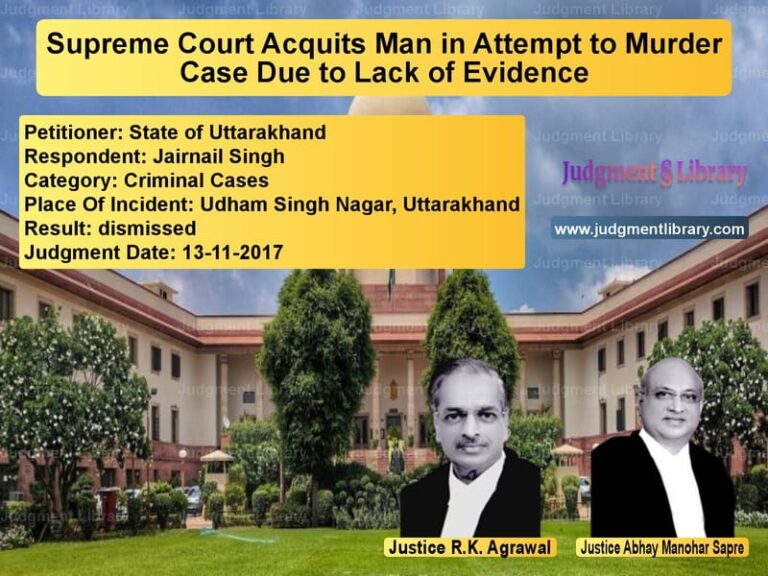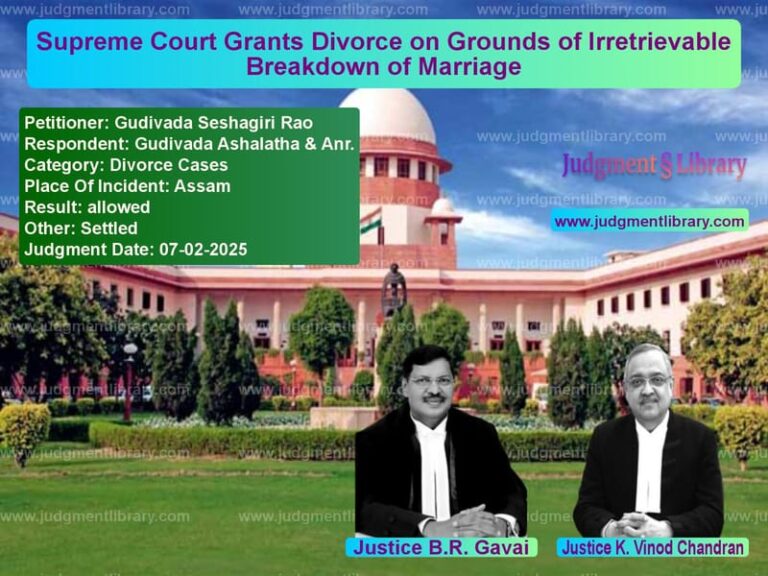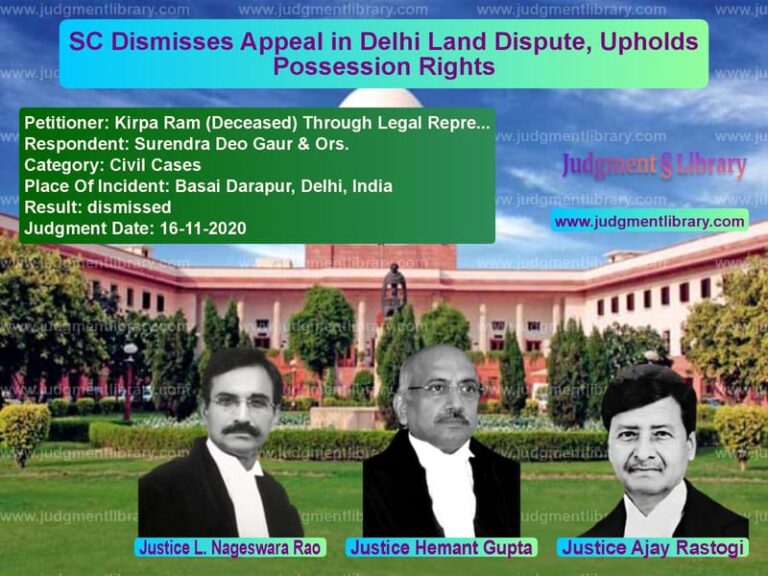Legal Battle Over IL&FS: Supreme Court Upholds Financial Accounts Recasting
The Supreme Court’s decision in Hari Sankaran vs. Union of India & Others is a landmark judgment addressing corporate mismanagement and fraudulent financial practices. The case revolves around Infrastructure Leasing & Financial Services Limited (IL&FS), a key player in India’s infrastructure financing sector. Due to financial irregularities and governance failures, the government intervened and sought to reopen and recast IL&FS’s financial accounts. The Supreme Court ultimately upheld the National Company Law Tribunal’s (NCLT) decision, ensuring transparency and accountability.
IL&FS, a systemically important non-banking financial company (NBFC), suffered a massive liquidity crisis in 2018, leading to defaults on loans and bonds worth thousands of crores. The government alleged that financial irregularities had been deliberately masked by the company’s board, causing severe risks to the economy and public interest.
Background of the Case
IL&FS, incorporated under the Companies Act, 1956, had 348 group companies, including IL&FS Financial Services Limited (IFIN) and IL&FS Transportation Networks Limited (ITNL). The company was a prominent infrastructure finance entity, backed by reputed institutional investors such as the Central Bank of India and HDFC Ltd.
The financial crisis surfaced when IL&FS began defaulting on its debt obligations. Investigations by the Registrar of Companies (ROC), the Serious Fraud Investigation Office (SFIO), and the Institute of Chartered Accountants of India (ICAI) revealed significant financial mismanagement. Reports indicated that the company had raised large sums from public sector banks and financial institutions while misrepresenting its financial position. The financial statements of IL&FS allegedly concealed negative cash flows, liquidity crises, and high levels of debt.
Government’s Intervention and Tribunal’s Ruling
The Union of India, through the Ministry of Corporate Affairs, filed a petition under Sections 241 and 242 of the Companies Act, 2013, alleging mismanagement and fraudulent financial reporting by IL&FS and its board members. The government sought:
- Immediate suspension of the existing board of directors.
- Appointment of a new board to manage IL&FS and its subsidiaries.
- Permission to reopen and recast IL&FS’s financial statements for the past five years.
The NCLT, after examining reports from SFIO, ICAI, and ROC, concluded that IL&FS’s affairs had been conducted in a manner prejudicial to public interest. The Tribunal suspended the existing board and appointed a new management team to oversee the company’s resolution process. Additionally, under Section 130 of the Companies Act, NCLT permitted the reopening and recasting of IL&FS’s financial statements for financial years 2012–2013 to 2017–2018.
Petitioner’s Arguments
Hari Sankaran, a former director of IL&FS, challenged the NCLT’s ruling, arguing:
- The legal conditions for reopening accounts under Section 130 of the Companies Act had not been satisfied.
- The Tribunal failed to provide a clear finding of fraudulent accounting.
- The order violated the principles of natural justice, as IL&FS was not given sufficient opportunity to respond.
- The financial crisis was due to external market conditions, not internal mismanagement.
Respondent’s Arguments
The Union of India defended the NCLT’s decision, stating:
- IL&FS had misrepresented its financial health and camouflaged its losses.
- The company’s board had engaged in reckless borrowing from public sector banks without adequate risk assessment.
- Independent reports from SFIO and ICAI confirmed fraudulent accounting practices.
- Recasting the accounts was necessary to uncover the true financial position and hold those responsible accountable.
Supreme Court’s Observations and Judgment
The Supreme Court, after considering arguments from both sides, upheld the NCLT’s decision. The Court ruled:
“Considering the larger public interest and the magnitude of financial mismanagement involved, the Tribunal was justified in allowing the reopening and recasting of IL&FS’s accounts under Section 130 of the Companies Act.”
The Court emphasized that public funds amounting to thousands of crores were at risk, and transparency in financial disclosures was paramount. The Tribunal had appropriately exercised its jurisdiction under the Companies Act, and there was no violation of legal principles.
Key Legal Precedents Considered
The Supreme Court referred to several previous rulings to support its decision:
- Mannalal Khetan v. Kedar Nath Khetan (1977) 2 SCC 424: Established that statutory procedures must be strictly followed.
- Swadeshi Cotton Mills v. Union of India (1981) 1 SCC 664: Reinforced the principle that when public interest is involved, corporate actions must be subjected to scrutiny.
- Mohinder Singh Gill v. Chief Election Commissioner (1978) 1 SCC 405: Stated that subsequent reports and findings can be considered when assessing public interest matters.
Impact of the Judgment
This Supreme Court ruling has significant implications for corporate governance in India:
- Strengthening Regulatory Oversight: The decision highlights the importance of regulatory bodies such as SFIO and ICAI in maintaining corporate accountability.
- Precedent for Future Corporate Investigations: The judgment reinforces the government’s ability to intervene in cases of large-scale financial mismanagement.
- Protecting Public Interest: By allowing the reopening of IL&FS’s financial statements, the ruling safeguards public funds and ensures financial transparency.
Conclusion
The Supreme Court’s decision in the IL&FS case underscores the critical role of corporate governance and financial accountability. The ruling reaffirms that companies handling public funds must adhere to strict financial integrity standards. This judgment sets a precedent for future cases where financial fraud and corporate mismanagement threaten the stability of the economy.
With the Supreme Court upholding the NCLT’s order, IL&FS’s financial restructuring is expected to proceed with greater transparency, ensuring that public trust in the financial system is restored.
Petitioner Name: Hari Sankaran.Respondent Name: Union of India & Others.Judgment By: Justice Indu Malhotra, Justice M. R. Shah.Place Of Incident: India.Judgment Date: 04-06-2019.
Don’t miss out on the full details! Download the complete judgment in PDF format below and gain valuable insights instantly!
Download Judgment: Hari Sankaran vs Union of India & Oth Supreme Court of India Judgment Dated 04-06-2019.pdf
Direct Downlaod Judgment: Direct downlaod this Judgment
See all petitions in Company Law
See all petitions in Corporate Governance
See all petitions in Shareholder Disputes
See all petitions in Bankruptcy and Insolvency
See all petitions in Judgment by Indu Malhotra
See all petitions in Judgment by Mukeshkumar Rasikbhai Shah
See all petitions in dismissed
See all petitions in supreme court of India judgments June 2019
See all petitions in 2019 judgments
See all posts in Corporate and Commercial Cases Category
See all allowed petitions in Corporate and Commercial Cases Category
See all Dismissed petitions in Corporate and Commercial Cases Category
See all partially allowed petitions in Corporate and Commercial Cases Category







